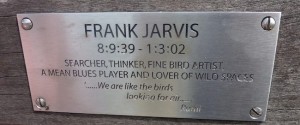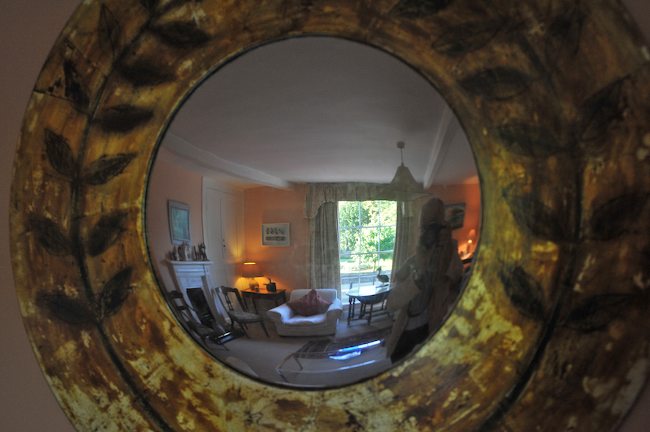Yep. According to an FoI request by the Guardian.
In memoriam
On a seat on a coastal path. According to this source, he was an artist specialising in bird-life. It’s a nice way to be remembered: the seat overlooks a mere where there were lots of diving (and squabbling) ducks this morning.
A pine start in life
Until this morning, wandering through a beautiful little pine-wood, I had no idea what pine cones looked like in their formative phase.
And then I came on this.
When we disturbed the branch, a dense cloud of very fine pollen wafted into the air.
Flickr version here.
The beach-head
Circular logic
Flickr version here.
New Yorker Editor: “I opted for clueless”
New Yorker editor, David Remnick, on the vexed question of paywalls.
“I was going to be damned if I was going to train 18-year-olds, 20-year-olds, 25-year-olds, that this is like water that comes out of the sink,” he said, about The New Yorker.
Mr. Remnick was speaking at a breakfast for advertisers and some reporters in the Condé Nast Executive Dining Rooml last Tuesday morning. He said that if you want expensive reporting, then you’ll have to pay for it. Let’s just say that Mr. Remnick probably isn’t going to get a lunch with Jeff Jarvis or Arianna Huffington anytime soon and talk Web religion.
“There have been many stages of Web evangelical thinking. You must do this! You have to do that! Or you are clueless,” clucked Mr. Remnick.
“Remember the days of information wants to be free?” he continued. “So therefore the only thing that anyone with any brains could do with a magazine like The New Yorker is to put the whole thing online and give it away. Give it away! And if you were against that in some way or you said, ‘Wait a minute,’ you were–wait for it–clueless.
“I opted for clueless,” he said.
Mr. Remnick spoke about the magazine's digital edition (which is its own animal, accessible for a $39.95 fee for people who don’t subscribe to the print edition) and how some content is still free on the web. He's figuring it out, just like everyone else. He’s not in a rush. But when he does figure it out, you will be paying. Two weeks ago, Mr. Remnick told the London-based Arabic paper Asharq Al-Awsat that there are “millions” of people who will willingly pay for the news.
Well, I’d be willing to pay for the New Yorker . In fact, I already do — through the nose for the print edition. But it’s surprising that his magazine’s legendary fact-checkers didn’t pick him up on one point — tapwater isn’t free. We pay water rates or water charges for it.
Jobs: Great unwashed don’t need PCs
Hmmm… This from TechEye.
It is official: Steve Jobs no longer thinks that PCs are going to be that important.
Speaking at the D8 conference, the Apple supremo said the day is coming when only one out of "every few people" will need a traditional computer.
For evidence he said that when the US was an agrarian nation, all cars were trucks because that's what you needed on the farms.
"Cars became more popular as cities rose, and things like power steering and automatic transmission became popular," he said.
He thinks that PCs are going to be like trucks. They are still going to be around… but only "one out of x people will need them."
Of course x is an unknown figure so Jobs is hedging his bets a bit. He could mean that only one in ten people will need one or one in two. It is a moot point if very many people need one now, but whether or not they own one is another matter.
Jobs claimed that advances in chips and software will allow tablet devices like the iPad to do tasks that today are really only suited for a traditional computer, things like video editing and graphic arts work.
He said that the move will make many PC veterans uneasy, "because the PC has taken us a long way."
"We like to talk about the post-PC era, but when it really starts to happen, it's uncomfortable," he said.
Needless to say, Ray Ozzie doesn’t agree.
BP: beyond irony
Stephen Hsu posted this image on his blog under the heading “BP advertisement from 1999”. The date (1999) seems improbable, in that BP didn’t enter the US market until 1998 (when it merged with Amoco) and the logo wasn’t launched until the company rebranded itself as BP plc in 2001. That doesn’t mean that the image of the ad is faked, only that the date attributed to it is wrong. Whatever the truth of the matter, it’s clever.
LATER: Mystery solved. Dermot Casey tweets that it’s from a t-shirt made by Despair Inc..
Quote of the day
“The brains of members of the Press departments of motion-picture studios resemble soup at a cheap restaurant. It is wiser not to stir them.”
P.G. Wodehouse, Blandings Castle and Elsewhere
How the Grid can ruin your alibi
This is both creepy and fascinating — from The Register.
ENF [electrical network frequency] analysis relies on frequency variations in the electricity supplied by the National Grid. Digital devices such as CCTV recorders, telephone recorders and camcorders that are plugged in to or located near the mains pick up these deviations in the power supply, which are caused by peaks and troughs in demand. Battery-powered devices are not immune to to ENF analysis, as grid frequency variations can be induced in their recordings from a distance.
At the Metropolitan Police's digital forensics lab in Penge, south London, scientists have created a database that has recorded these deviations once every one and a half seconds for the last five years. Over a short period they form a unique signature of the electrical frequency at that time, which research has shown is the same in London as it is in Glasgow.
On receipt of recordings made by the police or public, the scientists are able to detect the variations in mains electricity occuring at the time the recording was made. This signature is extracted and automatically matched against their ENF database, which indicates when it was made.
The technique can also uncover covert editing – or rule it out, as in the recent murder trial – because a spliced recording will register more than one ENF match.
The Met emphasised that ENF analysis is in its infancy as a practical tool, having been used in only around five cases to date. Proponents are optimistic about its uses in counter-terrorism investigations, for example to establish when suspects made reconnaissance videos of their targets, or to uncover editing in propaganda videos.
Dr Alan Cooper, the leader of the Met’s ENF project, said the technique is proving invaluable in serious cases, where audio and video evidence and its authenticity is often questioned.






